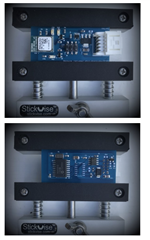I have developed a custom board with NRF52810 (Rigado), a standalone CAN controller (500 kbaud) and serial communication (57600 baud).
The SW is based on the BLE_APP_UART from SDK 15.3.0, SoftDevice S112, modified with SPI support. The custom board is flashed using the nrf52832 DK and Segger.
The NR52810 runs without external LF crystal (RC only).
The CAN controller uses SPI @4MHz and easy DMA. SPI_DEFAULT_CONFIG_IRQ_PRIORITY set to 3 (from default 6).
The serial communication is for receiving 10Hz GPS data.
The data from the SPI and serial comm are served by interrupt service routines (one for SPI and one for serial comm), and the data are put into global static structs.
The CAN data (from SPI) is transmitted over BLE each 40ms and data from the serial comm is transmitted over BLE each 100ms (app_timers reading the global static structs). Approx 100 bytes in each payload.
Everything is running fine for approx. 8-10h.
However, after 8-10h the serial communication stops (does not receive). The CAN/SPI communication and transmit over BLE runs as normal.
Power cycling my custom board does not help. Sometimes a reflash is needed in order to get the serial comm up and running again. Sometimes it is enough to just attach the nrf52832 DKs VDD, GND, SWD IO and SWD CLK pins to the corresponding pins on my custom board.
Any suggestions to why my serial comm stops after 8-10h?
Any suggestions to why power cycling does not result in a clean boot, resetting the serial comm?


